Good point. While Trump the man is fast fading into insignificance, his legacy lives on in that insults and misinformation have become legitimate political tools.So do Trump’s , fixed it for you .
COVID-19 'Pandemic'
- Thread starter Ocean Breeze
- Start date
You are using an out of date browser. It may not display this or other websites correctly.
You should upgrade or use an alternative browser.
You should upgrade or use an alternative browser.
LILLEY: Federal report points to problems with COVID border measures
Author of the article:Brian Lilley
Publishing date:May 30, 2021 • 23 hours ago • 3 minute read • 33 Comments
A group of protesters rally out front of the Radisson hotel on Dixon Rd., where travellers are forced to quarantine after arriving at nearby Pearson International Airport, on Thursday Feb. 11, 2021.
A group of protesters rally out front of the Radisson hotel on Dixon Rd., where travellers are forced to quarantine after arriving at nearby Pearson International Airport, on Thursday, Feb. 11, 2021. PHOTO BY JACK BOLAND /Toronto Sun
Article content
The Trudeau government is getting set to talk to the provinces about changes to COVID-19 border measures but not in the way some provinces have been asking for. Instead, Trudeau to is set to discuss ditching the highly unpopular COVID quarantine hotels for air travellers.
Too bad that appears to be the only thing Trudeau is ready to change because his own government’s report is pointing to holes in the system.
A report by the federal COVID-19 Testing and Screening Expert Advisory Panel found the hotel system was neither effective or efficient. It also found that the discrepancy of having air travellers stay up to three days at a hotel but land border crossers quarantine at home made no sense.
“I’ll be having a conversation with health ministers, on the implications of the report,” Patty Hajdu, the federal health minister, said on Friday.
The ongoing claim by the Trudeau Liberals, from the beginning of the pandemic, has been that travel is not an issue. The Liberals ignore the fact that the first cases in early 2020 were imported from China, then Iran, Egypt and eventually the United States. They still ignore that the third wave in Canada has been driven by the importation last December of the B.1.1.7 first discovered in the United Kingdom.
Advertisement
STORY CONTINUES BELOW
This advertisement has not loaded yet, but your article continues below.
Article content
The government’s expert advisory panel doesn’t miss that point.
“Previous border measures were insufficient to prevent the importation of the B.1.1.7 VoC, which is now the dominant strain in Ontario and British Columbia,” the report states.
Provincial health officials should remind Minister Hajdu of this when they meet and demand more be done. That doesn’t mean closing the borders but it does mean ensuring quarantine rules are followed, something currently not happening according to this report.
The panel members believe that while the quarantine hotels should be discontinued, more must be done to ensure effective and suitable quarantine at home.
“Travellers subject to quarantine must provide a suitable quarantine plan for approval and adhere to this plan,” the report states.
Advertisement
STORY CONTINUES BELOW
This advertisement has not loaded yet, but your article continues below.
Article content
That currently isn’t happening with most travellers simply asked if they have a place to quarantine, not if their plan is suitable or feasible.
“Continued efforts to monitor and, if needed, improve adherence to quarantine are warranted,” the report states.
Another issue raised by the report is the lack of compliance to the full testing regime.
“For example, air travellers submitted 31,616 arrival samples for testing from February 22 to March 6, 2021. However, only 21,100 samples for day 10 quarantine exit tests had been received by March 20,” the report states,” the report states.
That amounts to 33% of the sample group not submitting a second test. Data released by the Public Health Agency of Canada shows that 27% of all COVID-positive air travellers don’t test positive until their second test on day 8 or day 10.
Advertisement
STORY CONTINUES BELOW
This advertisement has not loaded yet, but your article continues below.
Article content
We could be missing out on thousands of COVID positive passengers, people who then spread the virus within their communities.
The Trudeau government continues to state that travel is not a major contributor to the spread of COVID by claiming just over 1% of cases are related to travel and the real issue is community spread. Yet in calculating the origin of cases, anyone infected by a traveller is counted as community spread, not travel.
The federal government’s own report points to problems with assessing the impact of travel.
“There is not enough information to understand how many chains of transmission were initiated by these travellers and what contribution travel makes to the overall burden of disease in Canada at this time,” the report states.
Advertisement
STORY CONTINUES BELOW
This advertisement has not loaded yet, but your article continues below.
Article content
MORE ON THIS TOPIC
Passengers at Toronto Pearson airport wait to head to hotels to quarantine on Monday, March 1, 2021.
End Canada's COVID-19 quarantine hotel stay: Expert panel
Travellers from an international flight line up at Pearson airport to board a shuttle that will take them to a quarantine hotel in Mississauga February 24, 2021.
HASSAN: Why is Canada's useless hotel quarantine policy still in place?
None
Third Toronto airport quarantine hotel hit by COVID outbreak
When federal and provincial officials meet this week, provincial ministers should demand that the feds fix the problems in their system as one part of stopping the growth of COVID. That means enforcing real quarantine measures, enforcing testing standards and reducing non-essential travel from non-citizens who have no reason or right to be here.
It’s not me pointing to problems in the system, it’s not an opposing premier, it is a report mandated by the federal government. The least they can do is listen to their own experts.
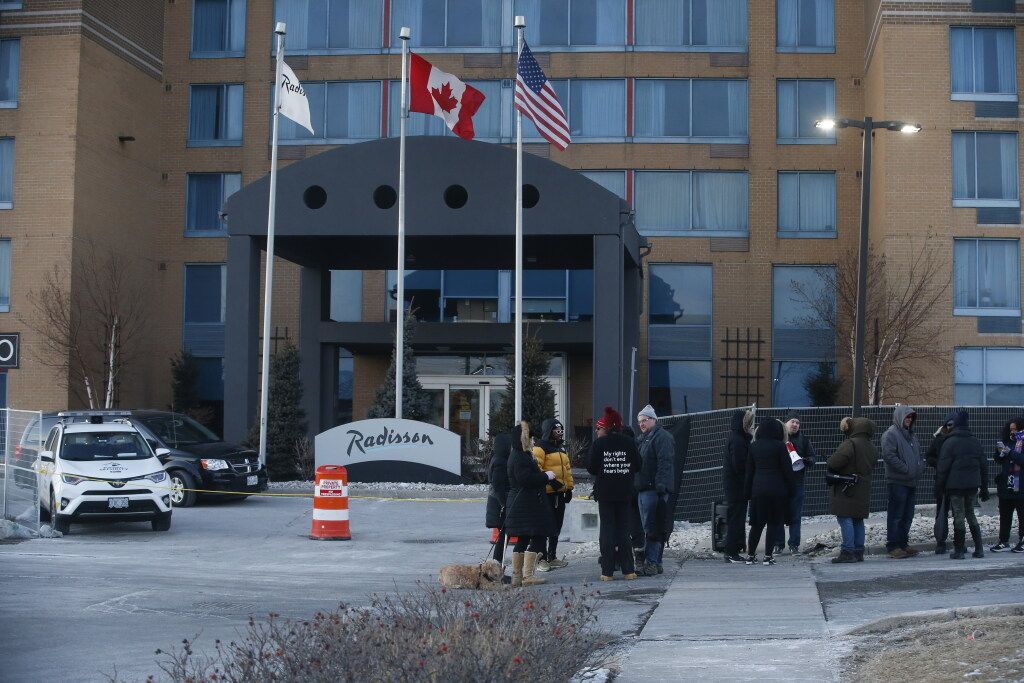
 torontosun.com
torontosun.com
Author of the article:Brian Lilley
Publishing date:May 30, 2021 • 23 hours ago • 3 minute read • 33 Comments
A group of protesters rally out front of the Radisson hotel on Dixon Rd., where travellers are forced to quarantine after arriving at nearby Pearson International Airport, on Thursday Feb. 11, 2021.
A group of protesters rally out front of the Radisson hotel on Dixon Rd., where travellers are forced to quarantine after arriving at nearby Pearson International Airport, on Thursday, Feb. 11, 2021. PHOTO BY JACK BOLAND /Toronto Sun
Article content
The Trudeau government is getting set to talk to the provinces about changes to COVID-19 border measures but not in the way some provinces have been asking for. Instead, Trudeau to is set to discuss ditching the highly unpopular COVID quarantine hotels for air travellers.
Too bad that appears to be the only thing Trudeau is ready to change because his own government’s report is pointing to holes in the system.
A report by the federal COVID-19 Testing and Screening Expert Advisory Panel found the hotel system was neither effective or efficient. It also found that the discrepancy of having air travellers stay up to three days at a hotel but land border crossers quarantine at home made no sense.
“I’ll be having a conversation with health ministers, on the implications of the report,” Patty Hajdu, the federal health minister, said on Friday.
The ongoing claim by the Trudeau Liberals, from the beginning of the pandemic, has been that travel is not an issue. The Liberals ignore the fact that the first cases in early 2020 were imported from China, then Iran, Egypt and eventually the United States. They still ignore that the third wave in Canada has been driven by the importation last December of the B.1.1.7 first discovered in the United Kingdom.
Advertisement
STORY CONTINUES BELOW
This advertisement has not loaded yet, but your article continues below.
Article content
The government’s expert advisory panel doesn’t miss that point.
“Previous border measures were insufficient to prevent the importation of the B.1.1.7 VoC, which is now the dominant strain in Ontario and British Columbia,” the report states.
Provincial health officials should remind Minister Hajdu of this when they meet and demand more be done. That doesn’t mean closing the borders but it does mean ensuring quarantine rules are followed, something currently not happening according to this report.
The panel members believe that while the quarantine hotels should be discontinued, more must be done to ensure effective and suitable quarantine at home.
“Travellers subject to quarantine must provide a suitable quarantine plan for approval and adhere to this plan,” the report states.
Advertisement
STORY CONTINUES BELOW
This advertisement has not loaded yet, but your article continues below.
Article content
That currently isn’t happening with most travellers simply asked if they have a place to quarantine, not if their plan is suitable or feasible.
“Continued efforts to monitor and, if needed, improve adherence to quarantine are warranted,” the report states.
Another issue raised by the report is the lack of compliance to the full testing regime.
“For example, air travellers submitted 31,616 arrival samples for testing from February 22 to March 6, 2021. However, only 21,100 samples for day 10 quarantine exit tests had been received by March 20,” the report states,” the report states.
That amounts to 33% of the sample group not submitting a second test. Data released by the Public Health Agency of Canada shows that 27% of all COVID-positive air travellers don’t test positive until their second test on day 8 or day 10.
Advertisement
STORY CONTINUES BELOW
This advertisement has not loaded yet, but your article continues below.
Article content
We could be missing out on thousands of COVID positive passengers, people who then spread the virus within their communities.
The Trudeau government continues to state that travel is not a major contributor to the spread of COVID by claiming just over 1% of cases are related to travel and the real issue is community spread. Yet in calculating the origin of cases, anyone infected by a traveller is counted as community spread, not travel.
The federal government’s own report points to problems with assessing the impact of travel.
“There is not enough information to understand how many chains of transmission were initiated by these travellers and what contribution travel makes to the overall burden of disease in Canada at this time,” the report states.
Advertisement
STORY CONTINUES BELOW
This advertisement has not loaded yet, but your article continues below.
Article content
Passengers at Toronto Pearson airport wait to head to hotels to quarantine on Monday, March 1, 2021.
End Canada's COVID-19 quarantine hotel stay: Expert panel
Travellers from an international flight line up at Pearson airport to board a shuttle that will take them to a quarantine hotel in Mississauga February 24, 2021.
HASSAN: Why is Canada's useless hotel quarantine policy still in place?
None
Third Toronto airport quarantine hotel hit by COVID outbreak
When federal and provincial officials meet this week, provincial ministers should demand that the feds fix the problems in their system as one part of stopping the growth of COVID. That means enforcing real quarantine measures, enforcing testing standards and reducing non-essential travel from non-citizens who have no reason or right to be here.
It’s not me pointing to problems in the system, it’s not an opposing premier, it is a report mandated by the federal government. The least they can do is listen to their own experts.

LILLEY: Federal report points to problems with COVID border measures
The Trudeau government is getting set to talk to the provinces about changes to COVID-19 border measures.
LILLEY: U.K. sees big spike in variant cases and hospitalizations -- is Canada next?
Will our reopening plans be derailed by a spike in cases from this new variant?
Author of the article:Brian Lilley
Publishing date:May 31, 2021 • 4 hours ago • 3 minute read • 59 Comments
A woman writes a message on a heart painted on the National COVID Memorial Wall on the south side of the River Thames in London on May 28, 2021, in memory of those who lost their lives to COVID-19.
A woman writes a message on a heart painted on the National COVID Memorial Wall on the south side of the River Thames in London on May 28, 2021, in memory of those who lost their lives to COVID-19. PHOTO BY DANIEL LEAL-OLIVAS /AFP via Getty Images
Article content
Britain was supposed to be Canada’s example of how to exit the COVID-19 pandemic — now it appears to be our canary in the coalmine.
After being a world leader in vaccinations, the U.K. is facing the prospects of a third wave and a delay in their scheduled June 21 reopening.
“Will freedom be delayed?” screams the headline at the Daily Mail. Over at the BBC, it’s “U.K. in early stages of third wave – scientist.” And at The Guardian they have, “End of England COVID lockdown on 21 June increasingly in doubt.”
This third wave is being driven by the B.1.617 variant and its many offspring. The variant was first found in India and arrived in the U.K. in March. Case numbers have been spiking and so have hospitalizations, which in a country still far ahead of Canada on the vaccination front, is the truly worrying part.
Cases in the U.K. have been above 3,000 for the past five days, putting the seven-day rolling average to 3,210, a number not seen since early April. It’s a 26.8% growth in cases over the past week while hospital admissions are up 23.2%.
Advertisement
STORY CONTINUES BELOW
This advertisement has not loaded yet, but your article continues below.
Article content
None of this is near the peak of what the U.K. experienced in January, with more than 50,000 positive cases each day and more than 4,000 people admitted daily, but medical advisors to the government are worrying.
“There has been exponential growth in the number of the new cases and at least three-quarters of them are the new variant,” Dr. Ravi Gupta told BBC over the weekend.
Gupta is a microbiologist and infectious disease specialist at Cambridge University and an advisor to the British government on COVID-19.
“Of course, the numbers of cases are relatively low at the moment — all waves start with low numbers of cases that grumble in the background and then become explosive, so the key here is that what we are seeing here is the signs of an early wave,” he said.
Advertisement
STORY CONTINUES BELOW
This advertisement has not loaded yet, but your article continues below.
Article content
And with that, Gupta and others are advising the government to pause the lifting of remaining restrictions for a few weeks.
“Unless there is a miracle, opening up further in June is a huge risk,” Prof. Martin McKee, from the London School of Hygiene and Tropical Medicine, told The Guardian.
So the question now becomes, does Canada need to be concerned about a fourth wave? Will our reopening plans be derailed by a spike in cases from this new variant? What does this mean for school reopening and the two-dose summer in Ontario?
While Canada and the U.K. are close in administering first doses – 58% of the U.K. population to 57% in Canada – they have 37% of their total population having two shots while we have just 5%.
That means we remain at greater risk. The U.K. is experiencing this new wave even with stricter border screening measures than we have in place.
Advertisement
STORY CONTINUES BELOW
This advertisement has not loaded yet, but your article continues below.
Article content
I know some will look at this and claim it’s just fear mongering, that we should open up like Florida and Texas, but let me make something clear — it’s not going to happen. It’s not the advice given by public health officials, it’s not where the elected officials want to go, and it is not something that most citizens are comfortable with.
From hospital and ICU capacity, early access to vaccines and even a higher tolerance for a high death count, Florida and Texas are very different from the situation here. Both states have death rates per 100,000 from COVID that run 2.5 times higher than Canada’s and almost three times Ontario’s rate.
Ontario Premier Doug Ford isn’t about to shift to following the path of Florida Gov. Ron DeSantis or Texas Gov. Greg Abbott at this point. He will stay the course he is on.
Which is why we need to watch what is happening in the U.K., monitor how they react to this variant, what works and what doesn’t. Because in terms of cases and government reaction, our future looks much more like Britain than it does Florida or Texas.
blilley@postmedia.com
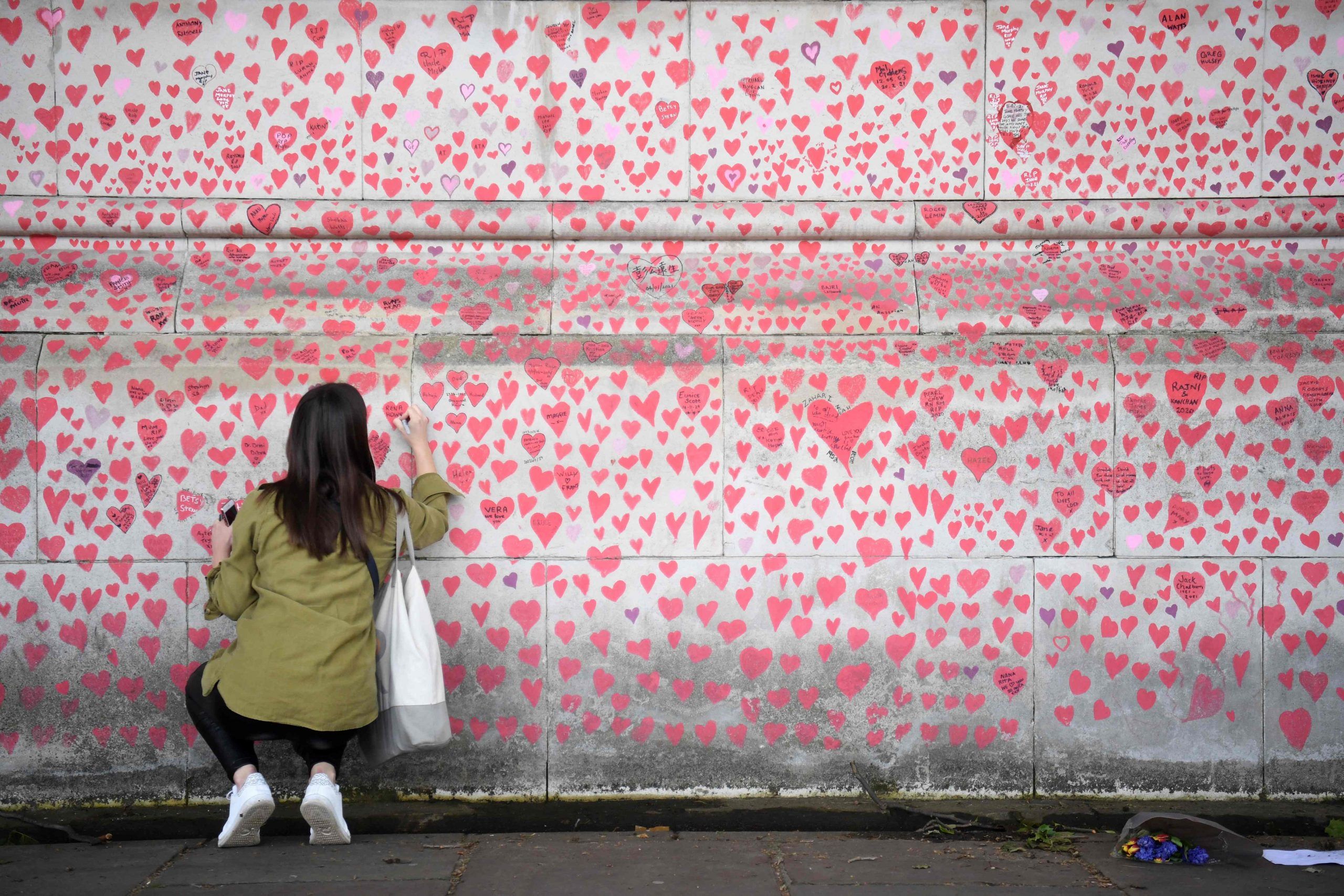
 torontosun.com
torontosun.com
Will our reopening plans be derailed by a spike in cases from this new variant?
Author of the article:Brian Lilley
Publishing date:May 31, 2021 • 4 hours ago • 3 minute read • 59 Comments
A woman writes a message on a heart painted on the National COVID Memorial Wall on the south side of the River Thames in London on May 28, 2021, in memory of those who lost their lives to COVID-19.
A woman writes a message on a heart painted on the National COVID Memorial Wall on the south side of the River Thames in London on May 28, 2021, in memory of those who lost their lives to COVID-19. PHOTO BY DANIEL LEAL-OLIVAS /AFP via Getty Images
Article content
Britain was supposed to be Canada’s example of how to exit the COVID-19 pandemic — now it appears to be our canary in the coalmine.
After being a world leader in vaccinations, the U.K. is facing the prospects of a third wave and a delay in their scheduled June 21 reopening.
“Will freedom be delayed?” screams the headline at the Daily Mail. Over at the BBC, it’s “U.K. in early stages of third wave – scientist.” And at The Guardian they have, “End of England COVID lockdown on 21 June increasingly in doubt.”
This third wave is being driven by the B.1.617 variant and its many offspring. The variant was first found in India and arrived in the U.K. in March. Case numbers have been spiking and so have hospitalizations, which in a country still far ahead of Canada on the vaccination front, is the truly worrying part.
Cases in the U.K. have been above 3,000 for the past five days, putting the seven-day rolling average to 3,210, a number not seen since early April. It’s a 26.8% growth in cases over the past week while hospital admissions are up 23.2%.
Advertisement
STORY CONTINUES BELOW
This advertisement has not loaded yet, but your article continues below.
Article content
None of this is near the peak of what the U.K. experienced in January, with more than 50,000 positive cases each day and more than 4,000 people admitted daily, but medical advisors to the government are worrying.
“There has been exponential growth in the number of the new cases and at least three-quarters of them are the new variant,” Dr. Ravi Gupta told BBC over the weekend.
Gupta is a microbiologist and infectious disease specialist at Cambridge University and an advisor to the British government on COVID-19.
“Of course, the numbers of cases are relatively low at the moment — all waves start with low numbers of cases that grumble in the background and then become explosive, so the key here is that what we are seeing here is the signs of an early wave,” he said.
Advertisement
STORY CONTINUES BELOW
This advertisement has not loaded yet, but your article continues below.
Article content
And with that, Gupta and others are advising the government to pause the lifting of remaining restrictions for a few weeks.
“Unless there is a miracle, opening up further in June is a huge risk,” Prof. Martin McKee, from the London School of Hygiene and Tropical Medicine, told The Guardian.
So the question now becomes, does Canada need to be concerned about a fourth wave? Will our reopening plans be derailed by a spike in cases from this new variant? What does this mean for school reopening and the two-dose summer in Ontario?
While Canada and the U.K. are close in administering first doses – 58% of the U.K. population to 57% in Canada – they have 37% of their total population having two shots while we have just 5%.
That means we remain at greater risk. The U.K. is experiencing this new wave even with stricter border screening measures than we have in place.
Advertisement
STORY CONTINUES BELOW
This advertisement has not loaded yet, but your article continues below.
Article content
I know some will look at this and claim it’s just fear mongering, that we should open up like Florida and Texas, but let me make something clear — it’s not going to happen. It’s not the advice given by public health officials, it’s not where the elected officials want to go, and it is not something that most citizens are comfortable with.
From hospital and ICU capacity, early access to vaccines and even a higher tolerance for a high death count, Florida and Texas are very different from the situation here. Both states have death rates per 100,000 from COVID that run 2.5 times higher than Canada’s and almost three times Ontario’s rate.
Ontario Premier Doug Ford isn’t about to shift to following the path of Florida Gov. Ron DeSantis or Texas Gov. Greg Abbott at this point. He will stay the course he is on.
Which is why we need to watch what is happening in the U.K., monitor how they react to this variant, what works and what doesn’t. Because in terms of cases and government reaction, our future looks much more like Britain than it does Florida or Texas.
blilley@postmedia.com

LILLEY: U.K. sees big spike in variant cases and hospitalizations -- is Canada next?
Will our reopening plans be derailed by a spike in cases from this new variant?
Is it all Greek to you? Coronavirus variants get new names
Author of the article:Reuters
Reuters
Emma Farge
Publishing date:May 31, 2021 • 1 hour ago • 1 minute read • Join the conversation
A public health digital board warns the public of a Covid-19 variant of concern affecting the community in Bolton, northwest England on May 14, 2021.
A public health digital board warns the public of a Covid-19 variant of concern affecting the community in Bolton, northwest England on May 14, 2021. PHOTO BY OLI SCARFF /AFP via Getty Images
Article content
GENEVA — Coronavirus variants with clunky, alphanumeric names have now been assigned the letters of the Greek Alphabet in a bid to simplify discussion and pronunciation while avoiding stigma.
The World Health Organization revealed the new names on Monday amid criticism that those given by scientists such as the so-called South African variant which goes by multiple names including B.1.351, 501Y.V2 and 20H/501Y.V2 were too complicated.
Meghan's suicidal cry for help made Prince Harry realize importance of listening
Trackerdslogo
As such, the four coronavirus variants considered of concern by the U.N. agency and known generally by the public as the UK, South Africa, Brazil and India variants have now been given the letters Alpha, Beta, Gamma, Delta according to the order of their detection.
Other variants of interest continue down the alphabet.
“While they have their advantages, these scientific names can be difficult to say and recall, and are prone to misreporting,” said the WHO, explaining the decision.
Advertisement
STORY CONTINUES BELOW
This advertisement has not loaded yet, but your article continues below.
Article content
The choice of the Greek Alphabet came after months of deliberations in which other possibilities such as Greek Gods and invented, pseudo-classical names were considered by experts, according to bacteriologist Mark Pallen who was involved in the talks.
But many were already brands, companies or alien names.
Another idea to refer to variants of concern as VOC1, VOC2 etc. was scrapped after he pointed out it resembled an English swear word.
Historically, viruses have often been associated with the locations from which they are thought to have emerged such as Ebola which is named after the eponymous Congolese river.
But this can be damaging for the places and often inaccurate such as with the so-called ‘Spanish flu’ pandemic of 1918 whose origins are unknown.
“No country should be stigmatized for detecting and reporting variants,” said WHO epidemiologist Maria Van Kerkhove.
Before the new WHO scheme, some scientists had adopted their own simplified nomenclature for variants such as a February paper using bird names. However, it was criticized on the grounds that this could imperil birds and by the mother of a girl named ‘Robin.’
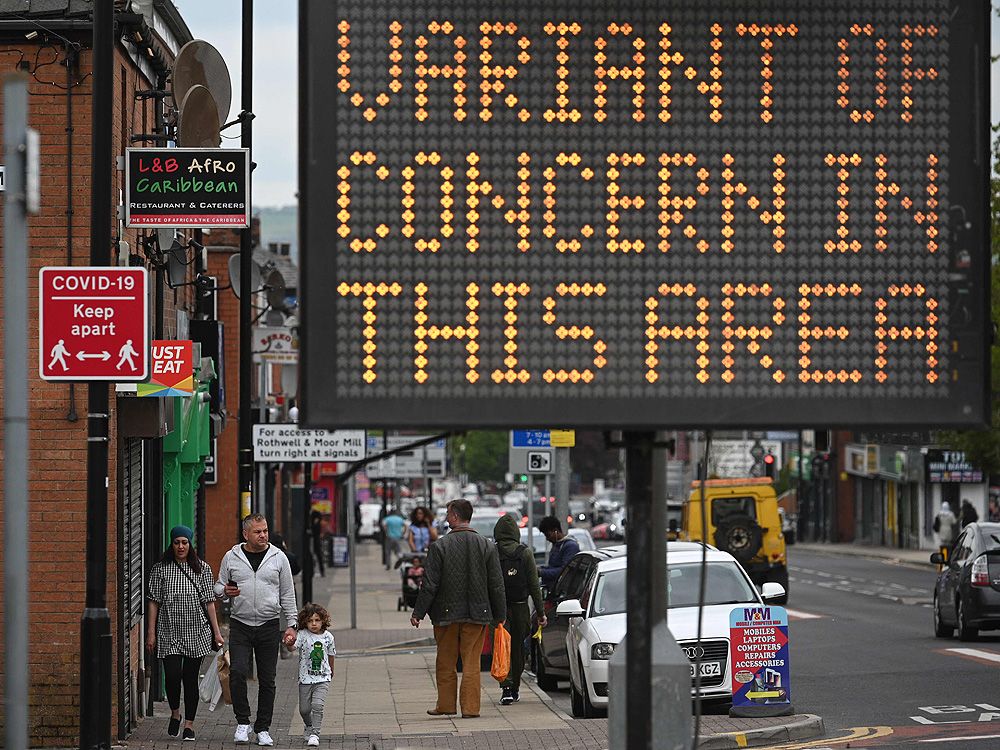
 torontosun.com
torontosun.com
Author of the article:Reuters
Reuters
Emma Farge
Publishing date:May 31, 2021 • 1 hour ago • 1 minute read • Join the conversation
A public health digital board warns the public of a Covid-19 variant of concern affecting the community in Bolton, northwest England on May 14, 2021.
A public health digital board warns the public of a Covid-19 variant of concern affecting the community in Bolton, northwest England on May 14, 2021. PHOTO BY OLI SCARFF /AFP via Getty Images
Article content
GENEVA — Coronavirus variants with clunky, alphanumeric names have now been assigned the letters of the Greek Alphabet in a bid to simplify discussion and pronunciation while avoiding stigma.
The World Health Organization revealed the new names on Monday amid criticism that those given by scientists such as the so-called South African variant which goes by multiple names including B.1.351, 501Y.V2 and 20H/501Y.V2 were too complicated.
Meghan's suicidal cry for help made Prince Harry realize importance of listening
Trackerdslogo
As such, the four coronavirus variants considered of concern by the U.N. agency and known generally by the public as the UK, South Africa, Brazil and India variants have now been given the letters Alpha, Beta, Gamma, Delta according to the order of their detection.
Other variants of interest continue down the alphabet.
“While they have their advantages, these scientific names can be difficult to say and recall, and are prone to misreporting,” said the WHO, explaining the decision.
Advertisement
STORY CONTINUES BELOW
This advertisement has not loaded yet, but your article continues below.
Article content
The choice of the Greek Alphabet came after months of deliberations in which other possibilities such as Greek Gods and invented, pseudo-classical names were considered by experts, according to bacteriologist Mark Pallen who was involved in the talks.
But many were already brands, companies or alien names.
Another idea to refer to variants of concern as VOC1, VOC2 etc. was scrapped after he pointed out it resembled an English swear word.
Historically, viruses have often been associated with the locations from which they are thought to have emerged such as Ebola which is named after the eponymous Congolese river.
But this can be damaging for the places and often inaccurate such as with the so-called ‘Spanish flu’ pandemic of 1918 whose origins are unknown.
“No country should be stigmatized for detecting and reporting variants,” said WHO epidemiologist Maria Van Kerkhove.
Before the new WHO scheme, some scientists had adopted their own simplified nomenclature for variants such as a February paper using bird names. However, it was criticized on the grounds that this could imperil birds and by the mother of a girl named ‘Robin.’

Is it all Greek to you? Coronavirus variants get new names
GENEVA — Coronavirus variants with clunky, alphanumeric names have now been assigned the letters of the Greek Alphabet in a bid to simplify discussion and pronuncia…
WHO, at heart of world's sluggish response to COVID, faces potential shake-up
Author of the article:Reuters
Reuters
Stephanie Nebehay
Publishing date:May 31, 2021 • 8 hours ago • 2 minute read • 29 Comments
World Health Organization Director General Tedros Adhanom Ghebreyesus speaks as he attends the World Health Assembly (WHA) in Geneva, Switzerland, May 24, 2021.
World Health Organization Director General Tedros Adhanom Ghebreyesus speaks as he attends the World Health Assembly (WHA) in Geneva, Switzerland, May 24, 2021. PHOTO BY CHRISTOPHER BLACK /REUTERS
Article content
GENEVA — The World Health Organization, at the heart of the world’s slow and stuttering handling of the COVID-19 pandemic, faces a potential shake-up aimed at preventing future outbreaks from destroying lives and livelihoods.
Health ministers agreed on Monday to study recommendations for ambitious reforms made by independent experts to strengthen the capacity of both the U.N. agency and countries to contain new pathogens.
Meghan's suicidal cry for help made Prince Harry realize importance of listening
Trackerdslogo
Under the resolution submitted by the European Union, and adopted by consensus, member states are to be firmly in the driver’s seat of the reforms through a year-long process.
The new virus has infected more than 170 million people and killed nearly 3.7 million, according to a Reuters tally of official national figures.
Health ministers from WHO’s 194 member states will also meet from Nov. 29 to decide whether to launch negotiations on an international treaty aimed at boosting defenses against any future pandemic.
Advertisement
STORY CONTINUES BELOW
This advertisement has not loaded yet, but your article continues below.
Article content
WHO’s emergencies director, Mike Ryan, welcomed the decisions, telling its annual ministerial assembly: “Right now the pathogens have the upper hand, they are emerging more frequently and often silently in a planet that is out of balance.
“We need to turn that very thing that has exposed us in this pandemic, our interconnectedness, we need to turn that into a strength,” he said.
The decisions, approved in committee, are due to be formally adopted in a plenary session later on Monday, the last day of its week-long assembly.
One panel, headed by former New Zealand Prime Minister Helen Clark and Ellen Johnson Sirleaf, a former president of Liberia, said that a new global system should be set up to respond faster to disease outbreaks to help ensure no future virus causes a pandemic as devastating as COVID-19.
Advertisement
STORY CONTINUES BELOW
This advertisement has not loaded yet, but your article continues below.
Article content
The experts, who found crucial failures in the global response in early 2020, said that the WHO should be given the power to send investigators swiftly to chase down new disease outbreaks and to publish their full findings without delay.
They also called for setting up a Global Health Threats Council, to be led at the head of state and government level, to maintain political commitment to pandemic preparedness.
“The world was hit by this virus unprepared. And if another virus emerged tomorrow this would be still be the case,” Bjorn Kummel, of Germany’s federal health ministry, said last week.
“A green light for this treaty process is the greatest commitment to learn from this crisis that this Assembly could have sent out. It is the most effective way to make sure that the global health crisis becomes the final one.”
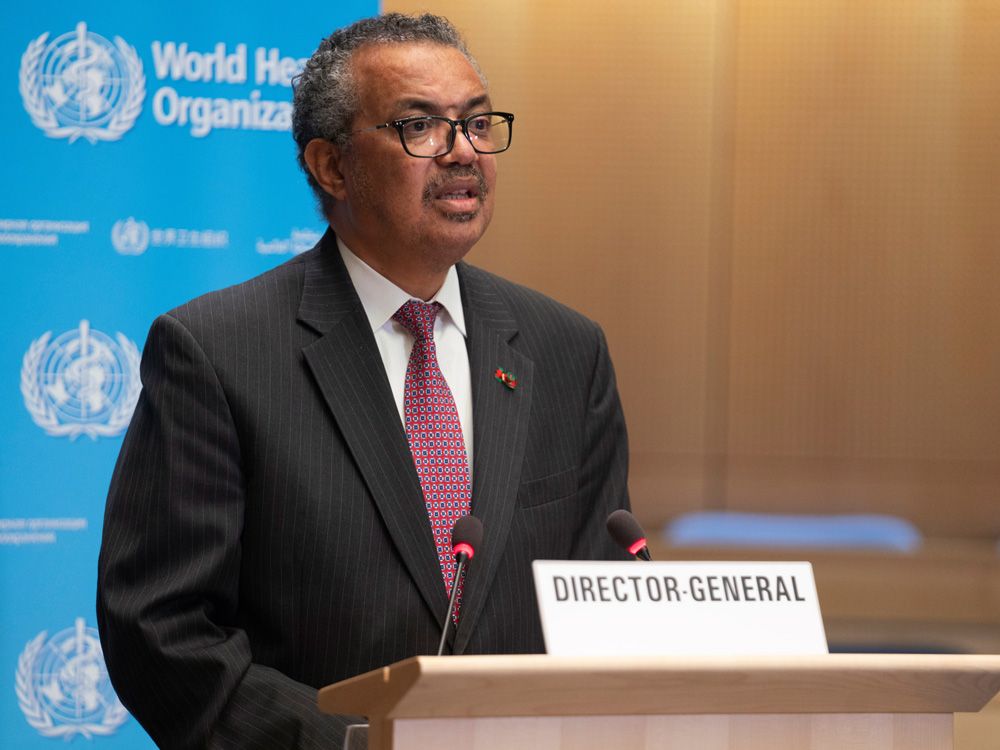
 torontosun.com
torontosun.com
Author of the article:Reuters
Reuters
Stephanie Nebehay
Publishing date:May 31, 2021 • 8 hours ago • 2 minute read • 29 Comments
World Health Organization Director General Tedros Adhanom Ghebreyesus speaks as he attends the World Health Assembly (WHA) in Geneva, Switzerland, May 24, 2021.
World Health Organization Director General Tedros Adhanom Ghebreyesus speaks as he attends the World Health Assembly (WHA) in Geneva, Switzerland, May 24, 2021. PHOTO BY CHRISTOPHER BLACK /REUTERS
Article content
GENEVA — The World Health Organization, at the heart of the world’s slow and stuttering handling of the COVID-19 pandemic, faces a potential shake-up aimed at preventing future outbreaks from destroying lives and livelihoods.
Health ministers agreed on Monday to study recommendations for ambitious reforms made by independent experts to strengthen the capacity of both the U.N. agency and countries to contain new pathogens.
Meghan's suicidal cry for help made Prince Harry realize importance of listening
Trackerdslogo
Under the resolution submitted by the European Union, and adopted by consensus, member states are to be firmly in the driver’s seat of the reforms through a year-long process.
The new virus has infected more than 170 million people and killed nearly 3.7 million, according to a Reuters tally of official national figures.
Health ministers from WHO’s 194 member states will also meet from Nov. 29 to decide whether to launch negotiations on an international treaty aimed at boosting defenses against any future pandemic.
Advertisement
STORY CONTINUES BELOW
This advertisement has not loaded yet, but your article continues below.
Article content
WHO’s emergencies director, Mike Ryan, welcomed the decisions, telling its annual ministerial assembly: “Right now the pathogens have the upper hand, they are emerging more frequently and often silently in a planet that is out of balance.
“We need to turn that very thing that has exposed us in this pandemic, our interconnectedness, we need to turn that into a strength,” he said.
The decisions, approved in committee, are due to be formally adopted in a plenary session later on Monday, the last day of its week-long assembly.
One panel, headed by former New Zealand Prime Minister Helen Clark and Ellen Johnson Sirleaf, a former president of Liberia, said that a new global system should be set up to respond faster to disease outbreaks to help ensure no future virus causes a pandemic as devastating as COVID-19.
Advertisement
STORY CONTINUES BELOW
This advertisement has not loaded yet, but your article continues below.
Article content
The experts, who found crucial failures in the global response in early 2020, said that the WHO should be given the power to send investigators swiftly to chase down new disease outbreaks and to publish their full findings without delay.
They also called for setting up a Global Health Threats Council, to be led at the head of state and government level, to maintain political commitment to pandemic preparedness.
“The world was hit by this virus unprepared. And if another virus emerged tomorrow this would be still be the case,” Bjorn Kummel, of Germany’s federal health ministry, said last week.
“A green light for this treaty process is the greatest commitment to learn from this crisis that this Assembly could have sent out. It is the most effective way to make sure that the global health crisis becomes the final one.”

WHO, at heart of world's sluggish response to COVID, faces potential shake-up
GENEVA — The World Health Organization, at the heart of the world’s slow and stuttering handling of the COVID-19 pandemic, faces a potential shake-up aimed at preve…
In every instance that you stupidly cite, nobody said any such thing.Re: COVIDD-19 'Pandemic'

However I do admire your posts. You must work hard to achieve such nonstop rubbish.
Tell someone who cares.Is it all Greek to you? Coronavirus variants get new names
Author of the article:Reuters
Reuters
Emma Farge
Publishing date:May 31, 2021 • 1 hour ago • 1 minute read • Join the conversation
A public health digital board warns the public of a Covid-19 variant of concern affecting the community in Bolton, northwest England on May 14, 2021.
A public health digital board warns the public of a Covid-19 variant of concern affecting the community in Bolton, northwest England on May 14, 2021. PHOTO BY OLI SCARFF /AFP via Getty Images
Article content
GENEVA — Coronavirus variants with clunky, alphanumeric names have now been assigned the letters of the Greek Alphabet in a bid to simplify discussion and pronunciation while avoiding stigma.
The World Health Organization revealed the new names on Monday amid criticism that those given by scientists such as the so-called South African variant which goes by multiple names including B.1.351, 501Y.V2 and 20H/501Y.V2 were too complicated.
Meghan's suicidal cry for help made Prince Harry realize importance of listening
Trackerdslogo
As such, the four coronavirus variants considered of concern by the U.N. agency and known generally by the public as the UK, South Africa, Brazil and India variants have now been given the letters Alpha, Beta, Gamma, Delta according to the order of their detection.
Other variants of interest continue down the alphabet.
“While they have their advantages, these scientific names can be difficult to say and recall, and are prone to misreporting,” said the WHO, explaining the decision.
Advertisement
STORY CONTINUES BELOW
This advertisement has not loaded yet, but your article continues below.
Article content
The choice of the Greek Alphabet came after months of deliberations in which other possibilities such as Greek Gods and invented, pseudo-classical names were considered by experts, according to bacteriologist Mark Pallen who was involved in the talks.
But many were already brands, companies or alien names.
Another idea to refer to variants of concern as VOC1, VOC2 etc. was scrapped after he pointed out it resembled an English swear word.
Historically, viruses have often been associated with the locations from which they are thought to have emerged such as Ebola which is named after the eponymous Congolese river.
But this can be damaging for the places and often inaccurate such as with the so-called ‘Spanish flu’ pandemic of 1918 whose origins are unknown.
“No country should be stigmatized for detecting and reporting variants,” said WHO epidemiologist Maria Van Kerkhove.
Before the new WHO scheme, some scientists had adopted their own simplified nomenclature for variants such as a February paper using bird names. However, it was criticized on the grounds that this could imperil birds and by the mother of a girl named ‘Robin.’

Is it all Greek to you? Coronavirus variants get new names
GENEVA — Coronavirus variants with clunky, alphanumeric names have now been assigned the letters of the Greek Alphabet in a bid to simplify discussion and pronuncia…torontosun.com
If you say so .Good point. While Trump the man is fast fading into insignificance, his legacy lives on in that insults and misinformation have become legitimate political tools.
Sounds good, the Asshole always has been insignificant. He LOOKED good at the start as he came across as a man who might actually do something and wouldn't take any shit, but as it turned out there was very little substance to any of his bluster and people with an iota of intelligence quickly saw right through him. His proclamation that the election was "rigged" just confirmed what a feeble specimen he turned out to be.Good point. While Trump the man is fast fading into insignificance, his legacy lives on in that insults and misinformation have become legitimate political tools.
Lowest unemployment rate among women and minority workers ever .Sounds good, the Asshole always has been insignificant. He LOOKED good at the start as he came across as a man who might actually do something and wouldn't take any shit, but as it turned out there was very little substance to any of his bluster and people with an iota of intelligence quickly saw right through him. His proclamation that the election was "rigged" just confirmed what a feeble specimen he turned out to be.
Israel sees probable link between Pfizer vaccine and myocarditis cases
Author of the article:Reuters
Reuters
Jeffrey Heller
Publishing date:Jun 02, 2021 • 1 hour ago • 2 minute read • 6 Comments
A paramedic with Israel's Magen David Adom medical services prepares a dose of the Pfizer-BioNTech COVID-19 vaccine to inoculate a Palestinian man in a mobile clinic on Feb. 26, 2021, at the Damascus Gate in Jerusalem's Old City.
A paramedic with Israel's Magen David Adom medical services prepares a dose of the Pfizer-BioNTech COVID-19 vaccine to inoculate a Palestinian man in a mobile clinic on Feb. 26, 2021, at the Damascus Gate in Jerusalem's Old City. PHOTO BY AHMAD GHARABLI /AFP via Getty Images
Article content
JERUSALEM — Israel’s Health Ministry said on Tuesday it had found the small number of heart inflammation cases observed mainly in young men who received Pfizer’s COVID-19 vaccine in Israel were likely linked to their vaccination.
Pfizer has said it has not observed a higher rate of the condition, known as myocarditis, than would normally be expected in the general population.
In Israel, 275 cases of myocarditis were reported between December 2020 and May 2021 among more than 5 million vaccinated people, the ministry said in disclosing the findings of a study it commissioned to examine the matter.
Most patients who experienced heart inflammation spent no more than four days in the hospital and 95% of the cases were classified as mild, according to the study, which the ministry said was conducted by three teams of experts.
The study found “there is a probable link between receiving the second dose (of Pfizer) vaccine and the appearance of myocarditis among men aged 16 to 30,” it said in a statement.
Advertisement
STORY CONTINUES BELOW
Article content
According to the findings, such a link was observed more among men aged 16 to 19 than in other age groups.
The European Medicines Agency (EMA) said last week that heart inflammation following vaccination with Comirnaty had been no cause for concern as they continued to happen at a rate that typically affected the general population. It added at the time that young men were particularly prone to the condition.
A U.S. Centers for Disease Control and Prevention advisory group last month recommended further study of the possibility of a link between myocarditis and mRNA vaccines, which include those from Pfizer and Moderna Inc.
CDC monitoring systems had not found more cases than would be expected in the population, but the advisory group said in a statement that members felt healthcare providers should be made aware of reports of a “potential adverse event.”
Advertisement
STORY CONTINUES BELOW
Article content
Pfizer said in a statement that it is aware of the Israeli observations of myocarditis and said no causal link to its vaccine has been established.
Adverse events are thoroughly reviewed and Pfizer meets regularly with the Vaccine Safety Department of the Israeli Ministry of Health to review data, it said.
Israel had held off making its 12- to 15-year-old population eligible for the vaccines, pending the Health Ministry report. In parallel to publishing those findings, a ministry committee approved vaccinating the adolescents, a senior official said.
“The committee gave the green light for vaccinating 12- to 15-year-olds, and this will be possible as of next week,” Nachman Ash, Israel’s pandemic-response coordinator, told Radio 103 FM. “The efficacy of the vaccine outweighs the risk.”
Israel has been a world leader in its vaccination rollout.
With COVID-19 infections down to just a handful a day and total active cases at just 340 across the country, the economy has fully opened, though restrictions remain on incoming tourism.
About 55% of Israel’s population has already been vaccinated. As of Tuesday, restrictions on social distancing and the need for special green vaccination passes to enter certain restaurants and venues were scrapped.
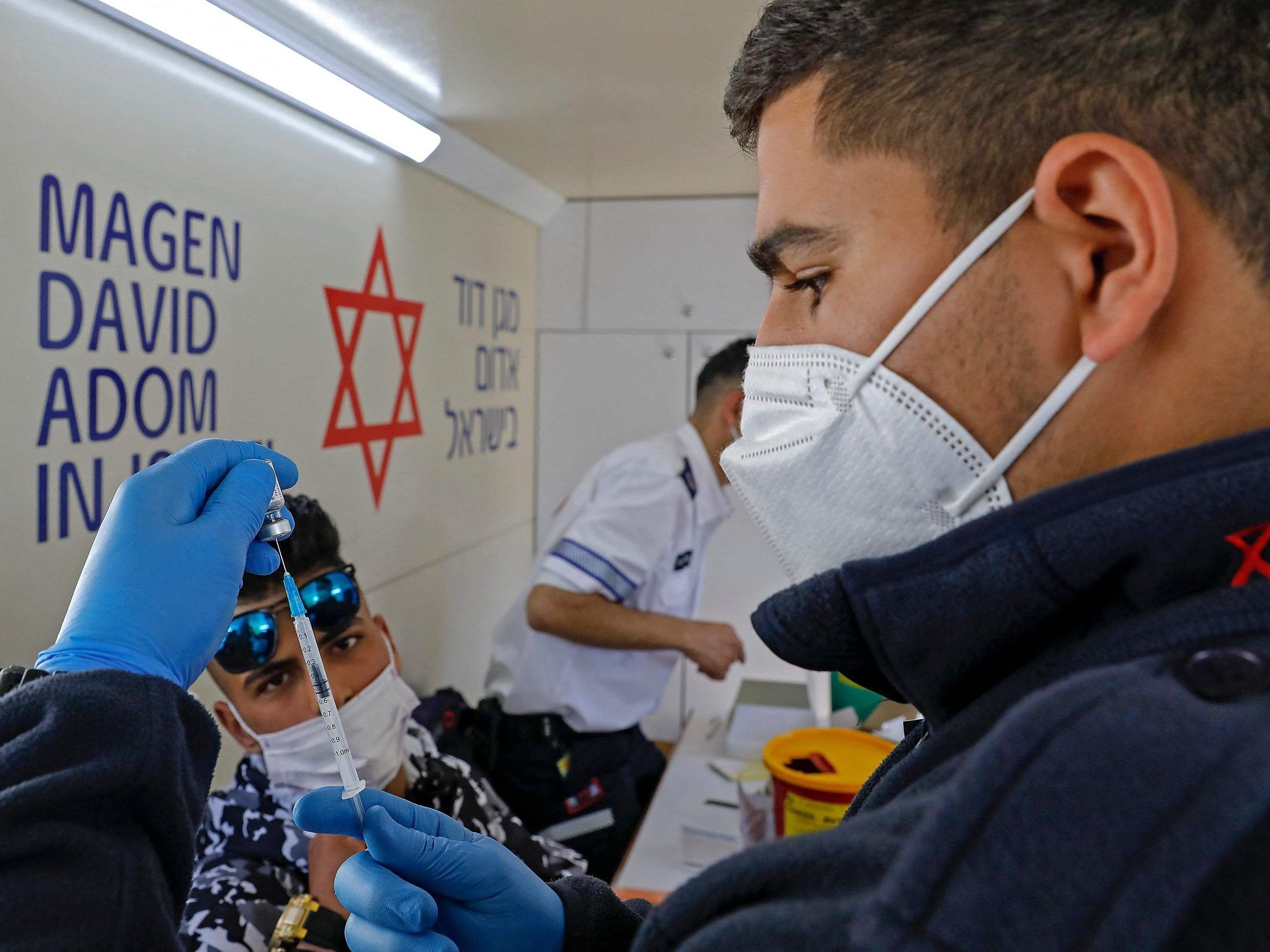
 torontosun.com
torontosun.com
Author of the article:Reuters
Reuters
Jeffrey Heller
Publishing date:Jun 02, 2021 • 1 hour ago • 2 minute read • 6 Comments
A paramedic with Israel's Magen David Adom medical services prepares a dose of the Pfizer-BioNTech COVID-19 vaccine to inoculate a Palestinian man in a mobile clinic on Feb. 26, 2021, at the Damascus Gate in Jerusalem's Old City.
A paramedic with Israel's Magen David Adom medical services prepares a dose of the Pfizer-BioNTech COVID-19 vaccine to inoculate a Palestinian man in a mobile clinic on Feb. 26, 2021, at the Damascus Gate in Jerusalem's Old City. PHOTO BY AHMAD GHARABLI /AFP via Getty Images
Article content
JERUSALEM — Israel’s Health Ministry said on Tuesday it had found the small number of heart inflammation cases observed mainly in young men who received Pfizer’s COVID-19 vaccine in Israel were likely linked to their vaccination.
Pfizer has said it has not observed a higher rate of the condition, known as myocarditis, than would normally be expected in the general population.
In Israel, 275 cases of myocarditis were reported between December 2020 and May 2021 among more than 5 million vaccinated people, the ministry said in disclosing the findings of a study it commissioned to examine the matter.
Most patients who experienced heart inflammation spent no more than four days in the hospital and 95% of the cases were classified as mild, according to the study, which the ministry said was conducted by three teams of experts.
The study found “there is a probable link between receiving the second dose (of Pfizer) vaccine and the appearance of myocarditis among men aged 16 to 30,” it said in a statement.
Advertisement
STORY CONTINUES BELOW
Article content
According to the findings, such a link was observed more among men aged 16 to 19 than in other age groups.
The European Medicines Agency (EMA) said last week that heart inflammation following vaccination with Comirnaty had been no cause for concern as they continued to happen at a rate that typically affected the general population. It added at the time that young men were particularly prone to the condition.
A U.S. Centers for Disease Control and Prevention advisory group last month recommended further study of the possibility of a link between myocarditis and mRNA vaccines, which include those from Pfizer and Moderna Inc.
CDC monitoring systems had not found more cases than would be expected in the population, but the advisory group said in a statement that members felt healthcare providers should be made aware of reports of a “potential adverse event.”
Advertisement
STORY CONTINUES BELOW
Article content
Pfizer said in a statement that it is aware of the Israeli observations of myocarditis and said no causal link to its vaccine has been established.
Adverse events are thoroughly reviewed and Pfizer meets regularly with the Vaccine Safety Department of the Israeli Ministry of Health to review data, it said.
Israel had held off making its 12- to 15-year-old population eligible for the vaccines, pending the Health Ministry report. In parallel to publishing those findings, a ministry committee approved vaccinating the adolescents, a senior official said.
“The committee gave the green light for vaccinating 12- to 15-year-olds, and this will be possible as of next week,” Nachman Ash, Israel’s pandemic-response coordinator, told Radio 103 FM. “The efficacy of the vaccine outweighs the risk.”
Israel has been a world leader in its vaccination rollout.
With COVID-19 infections down to just a handful a day and total active cases at just 340 across the country, the economy has fully opened, though restrictions remain on incoming tourism.
About 55% of Israel’s population has already been vaccinated. As of Tuesday, restrictions on social distancing and the need for special green vaccination passes to enter certain restaurants and venues were scrapped.

Israel sees probable link between Pfizer vaccine and myocarditis cases
JERUSALEM — Israel’s Health Ministry said on Tuesday it had found the small number of heart inflammation cases observed mainly in young men who received Pfizer’s CO…
Businesses at high risk in pandemic's final days as subsidies fade, reopening delayed
Author of the article:Canadian Press
Canadian Press
Brett Bundale
Publishing date:Jun 01, 2021 • 1 day ago • 4 minute read • Join the conversation
A sign in a barber shop window indicated the establishment was closed because of COVID-19 in Ottawa, Wednesday, March 18, 2020.
A sign in a barber shop window indicated the establishment was closed because of COVID-19 in Ottawa, Wednesday, March 18, 2020. PHOTO BY ADRIAN WYLD /THE CANADIAN PRESS
Article content
HALIFAX — Lisa Drader-Murphy opened her first store in 1997 with $250 in the bank.
Over more than two decades, the Canadian fashion designer built her luxury clothing brand debt-free by reinvesting her earnings back into the business.
Police seize 1,500 plants and a 'lethal spear' during cannabis raids
Trackerdslogo
“I was raised with old-fashioned values,” she said from her home in Falmouth, a village in rural Nova Scotia. “You dig your heels in and you just get the hard work done. I haven’t had to rely on government funding for anything.”
But pandemic restrictions upended Drader-Murphy’s retail business, repeatedly forcing the closure of her five stores, cutting off most of her income and pushing her into debt.
It’s a situation that has already forced many businesses in Canada to permanently close.
Now business groups are warning that many more may not survive the summer as federal aid begins to phase out before the economy fully reopens.
Eliminating wage and rent subsidies before businesses are fully operational could unleash a wave of closures in the pandemic’s final days, they say.
Advertisement
STORY CONTINUES BELOW
Article content
“Many businesses have had no revenue for months and they’ve taken on huge amounts of debt,” said Corinne Pohlmann, senior vice-president of national affairs for the Canadian Federation of Independent Business.
“Cutting back on subsidies prematurely when businesses are still closed or severely restricted is a recipe for disaster.”
BUSINESS TRENDS(IN NEW TAB)
Sponsored by
Market One
(in new tab)
Article image
Why prospects of a new discovery put Pan Global Resources at the forefront of the copper space
Article image
HealthSpace is transforming government efficiency through innovative technology
Article image
Max Resource is discovering large-scale exploration potential in South America
Article image
UGE International: A decade of renewable energy experience
Article image
Use of Interac e-Transfer has skyrocketed throughout the pandemic
Article image
PopReach is gearing up for continued success in the mobile gaming industry
Article image
ION Energy is poised to become a significant player in the booming lithium market
Article image
Alvopetro is a leading independent natural gas company in Brazil
Article image
Fiore’s success story starts with top-shelf premium cannabis
Article image
This investment will save you money and contribute to a greener future
Scroll leftScroll right
Article content
The latest round of lockdowns across the country have been some of the strictest yet, hitting non-essential retailers along with the hospitality and events industries particularly hard.
While restrictions are expected to begin easing in the coming weeks, Pohlmann said hiring and training staff, getting new inventory in stock and attracting customers back “doesn’t happen overnight.”
Advertisement
STORY CONTINUES BELOW
Article content
“Businesses are just trying to get to the other side of these restrictions,” she said. “But with lockdowns or strict measures still in place and many businesses deep in debt, many just won’t survive without subsidies.”
The federal government has provided businesses with wage and rent subsidies and lockdown support during the pandemic. These measures have been extended to September but they’ll begin steadily phasing out next month.
Katherine Cuplinskas, a spokeswoman for Finance Minister Chrystia Freeland, said in an email that Ottawa will continue to support small businesses through a new hiring program, business financing program and other measures.
While Pohlmann said she welcomes the hiring incentive, she said the wage and rent subsidies may still be required by some businesses past September given ongoing delays with provincial reopening plans.
Advertisement
STORY CONTINUES BELOW
Article content
Chair Decor president Liz Clark agrees that her company will likely need more time to get up and running.
The Toronto-area company rents out chairs, linens and other accessories for events and has recorded a 97 per cent drop in revenues due to the pandemic.
With the events industry forecasting a slow and bumpy recovery, she said the federal aid will likely be phased out before the Woodbridge, Ont., business is back up and running.
“We’re not going to see a return to business before the subsidies start decreasing,” Clark said. “All of our summer weddings are cancelled or postponed at this point. If you were to look at our books right now, you would say there’s no revenue coming down the line because there are no events scheduled to go ahead yet.”
Advertisement
STORY CONTINUES BELOW
Article content
Diane J. Brisebois, president and CEO of the Retail Council of Canada, said smaller merchants and non-essential retailers are being left behind.
“I think people would be shocked at the number of businesses that may not make it in the final days of the pandemic if more isn’t done,” she said.
“There needs to be more attention paid to those retail businesses that have not been able to open or operate fully. They’re suffering and they’re in debt.”
For designer and entrepreneur Drader-Murphy, she said her losses continue to add up.
While she shifted early in the pandemic to making masks — the designer has a background in technical industrial apparel and safety gear — that market slowed down quickly. But those sales bolstered her revenues just long enough to make her ineligible for the first wave of subsidies.
Advertisement
STORY CONTINUES BELOW
Article content
“We had five weeks of making masks that made up for the loss of all of our stores being closed,” Drader-Murphy said. “Then all of a sudden those sales slowed and even though my stores were still closed, I had to pay 100 per cent of my commercial rent because I didn’t qualify for the first round of subsidies.”
Then one of her last remaining income streams was abruptly cut off when the Nova Scotia government banned travel between communities in the province earlier this spring. The decision forced her to refund months of bookings at Willow Vale Estate, a boutique vacation rental she operates in Falmouth that normally attracts international guests but has focused on locals during the pandemic.
“That was the only thing keeping us going,” Drader-Murphy said. “To have every industry in my household wiped out has been disastrous.”
With cancelled bookings and closed stores, she’s had to use a significant chunk of her retirement savings to pay bills.
But a provincial decision to allow non-essential retailers to open at 25 per cent capacity starting Wednesday will help, she said.
“It will mean I’m getting less in debt than I was when we were completely closed,” Drader-Murphy said. “It’s not very sustainable but I’m happy that we’re at least moving in that direction.”
She added: “It gives us a fighting chance.”
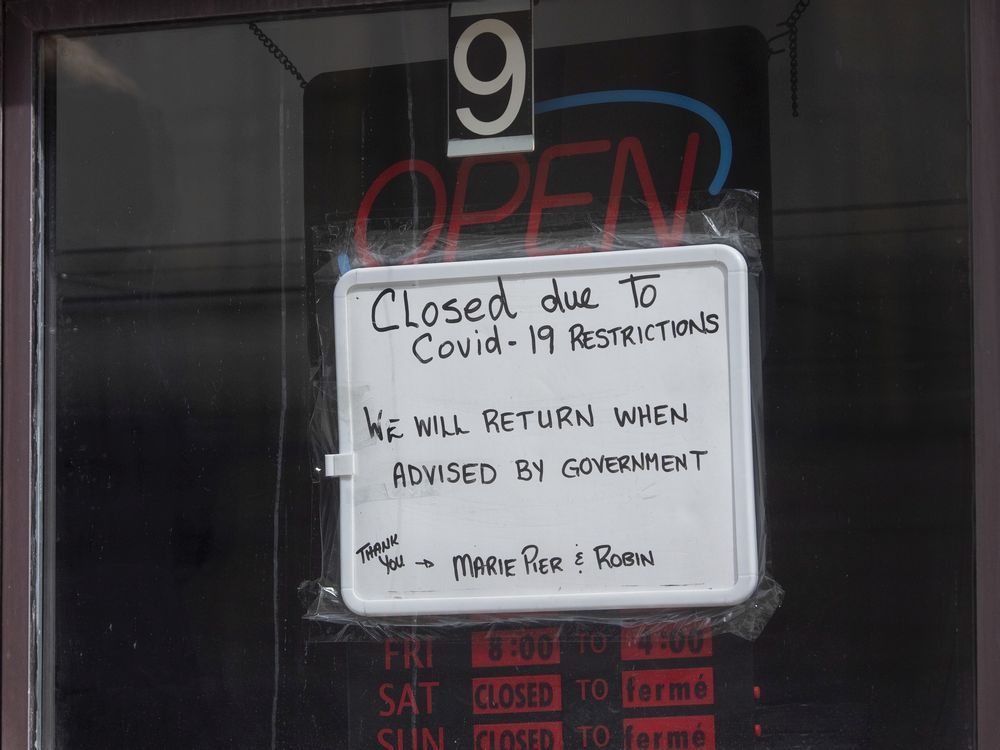
 torontosun.com
torontosun.com
Author of the article:Canadian Press
Canadian Press
Brett Bundale
Publishing date:Jun 01, 2021 • 1 day ago • 4 minute read • Join the conversation
A sign in a barber shop window indicated the establishment was closed because of COVID-19 in Ottawa, Wednesday, March 18, 2020.
A sign in a barber shop window indicated the establishment was closed because of COVID-19 in Ottawa, Wednesday, March 18, 2020. PHOTO BY ADRIAN WYLD /THE CANADIAN PRESS
Article content
HALIFAX — Lisa Drader-Murphy opened her first store in 1997 with $250 in the bank.
Over more than two decades, the Canadian fashion designer built her luxury clothing brand debt-free by reinvesting her earnings back into the business.
Police seize 1,500 plants and a 'lethal spear' during cannabis raids
Trackerdslogo
“I was raised with old-fashioned values,” she said from her home in Falmouth, a village in rural Nova Scotia. “You dig your heels in and you just get the hard work done. I haven’t had to rely on government funding for anything.”
But pandemic restrictions upended Drader-Murphy’s retail business, repeatedly forcing the closure of her five stores, cutting off most of her income and pushing her into debt.
It’s a situation that has already forced many businesses in Canada to permanently close.
Now business groups are warning that many more may not survive the summer as federal aid begins to phase out before the economy fully reopens.
Eliminating wage and rent subsidies before businesses are fully operational could unleash a wave of closures in the pandemic’s final days, they say.
Advertisement
STORY CONTINUES BELOW
Article content
“Many businesses have had no revenue for months and they’ve taken on huge amounts of debt,” said Corinne Pohlmann, senior vice-president of national affairs for the Canadian Federation of Independent Business.
“Cutting back on subsidies prematurely when businesses are still closed or severely restricted is a recipe for disaster.”
BUSINESS TRENDS(IN NEW TAB)
Sponsored by
Market One
(in new tab)
Article image
Why prospects of a new discovery put Pan Global Resources at the forefront of the copper space
Article image
HealthSpace is transforming government efficiency through innovative technology
Article image
Max Resource is discovering large-scale exploration potential in South America
Article image
UGE International: A decade of renewable energy experience
Article image
Use of Interac e-Transfer has skyrocketed throughout the pandemic
Article image
PopReach is gearing up for continued success in the mobile gaming industry
Article image
ION Energy is poised to become a significant player in the booming lithium market
Article image
Alvopetro is a leading independent natural gas company in Brazil
Article image
Fiore’s success story starts with top-shelf premium cannabis
Article image
This investment will save you money and contribute to a greener future
Scroll leftScroll right
Article content
The latest round of lockdowns across the country have been some of the strictest yet, hitting non-essential retailers along with the hospitality and events industries particularly hard.
While restrictions are expected to begin easing in the coming weeks, Pohlmann said hiring and training staff, getting new inventory in stock and attracting customers back “doesn’t happen overnight.”
Advertisement
STORY CONTINUES BELOW
Article content
“Businesses are just trying to get to the other side of these restrictions,” she said. “But with lockdowns or strict measures still in place and many businesses deep in debt, many just won’t survive without subsidies.”
The federal government has provided businesses with wage and rent subsidies and lockdown support during the pandemic. These measures have been extended to September but they’ll begin steadily phasing out next month.
Katherine Cuplinskas, a spokeswoman for Finance Minister Chrystia Freeland, said in an email that Ottawa will continue to support small businesses through a new hiring program, business financing program and other measures.
While Pohlmann said she welcomes the hiring incentive, she said the wage and rent subsidies may still be required by some businesses past September given ongoing delays with provincial reopening plans.
Advertisement
STORY CONTINUES BELOW
Article content
Chair Decor president Liz Clark agrees that her company will likely need more time to get up and running.
The Toronto-area company rents out chairs, linens and other accessories for events and has recorded a 97 per cent drop in revenues due to the pandemic.
With the events industry forecasting a slow and bumpy recovery, she said the federal aid will likely be phased out before the Woodbridge, Ont., business is back up and running.
“We’re not going to see a return to business before the subsidies start decreasing,” Clark said. “All of our summer weddings are cancelled or postponed at this point. If you were to look at our books right now, you would say there’s no revenue coming down the line because there are no events scheduled to go ahead yet.”
Advertisement
STORY CONTINUES BELOW
Article content
Diane J. Brisebois, president and CEO of the Retail Council of Canada, said smaller merchants and non-essential retailers are being left behind.
“I think people would be shocked at the number of businesses that may not make it in the final days of the pandemic if more isn’t done,” she said.
“There needs to be more attention paid to those retail businesses that have not been able to open or operate fully. They’re suffering and they’re in debt.”
For designer and entrepreneur Drader-Murphy, she said her losses continue to add up.
While she shifted early in the pandemic to making masks — the designer has a background in technical industrial apparel and safety gear — that market slowed down quickly. But those sales bolstered her revenues just long enough to make her ineligible for the first wave of subsidies.
Advertisement
STORY CONTINUES BELOW
Article content
“We had five weeks of making masks that made up for the loss of all of our stores being closed,” Drader-Murphy said. “Then all of a sudden those sales slowed and even though my stores were still closed, I had to pay 100 per cent of my commercial rent because I didn’t qualify for the first round of subsidies.”
Then one of her last remaining income streams was abruptly cut off when the Nova Scotia government banned travel between communities in the province earlier this spring. The decision forced her to refund months of bookings at Willow Vale Estate, a boutique vacation rental she operates in Falmouth that normally attracts international guests but has focused on locals during the pandemic.
“That was the only thing keeping us going,” Drader-Murphy said. “To have every industry in my household wiped out has been disastrous.”
With cancelled bookings and closed stores, she’s had to use a significant chunk of her retirement savings to pay bills.
But a provincial decision to allow non-essential retailers to open at 25 per cent capacity starting Wednesday will help, she said.
“It will mean I’m getting less in debt than I was when we were completely closed,” Drader-Murphy said. “It’s not very sustainable but I’m happy that we’re at least moving in that direction.”
She added: “It gives us a fighting chance.”

Businesses at high risk in pandemic's final days as subsidies fade, reopening delayed
HALIFAX — Lisa Drader-Murphy opened her first store in 1997 with $250 in the bank.
COVID-19 deaths brought Canadian life expectancy down, Quebec most affected: StatCan
Author of the article:Canadian Press
Canadian Press
Publishing date:Jun 01, 2021 • 1 day ago • 1 minute read • Join the conversation
Redeployed nurses Angela Bedard, left, and Andrea Blake tend to a patient suffering from coronavirus disease (COVID-19) at Humber River Hospital's Intensive Care Unit in Toronto on April 28, 2021.
Redeployed nurses Angela Bedard, left, and Andrea Blake tend to a patient suffering from coronavirus disease (COVID-19) at Humber River Hospital's Intensive Care Unit in Toronto on April 28, 2021. PHOTO BY COLE BURSTON / AFP /Toronto Sun
Article content
MONTREAL — The federal statistics agency says the COVID-19 pandemic led to a drop in Canada’s life expectancy in 2020.
Statistics Canada says it estimates that life expectancy across the country declined by an average of 0.41 years in 2020, adding that the 15,651 deaths caused by COVID-19 contributed to that drop.
It estimates that life expectancy in Quebec — where 8,226 deaths were linked to COVID-19 in 2020 — declined by 0.84 years. In Manitoba, where life expectancy is estimated to have dropped by 0.6 years, is the only other province with a decline above the Canadian average.
Statistics Canada says the average age of people who died from COVID-19 in 2020 was 83.8 years. In 2019, the average age at death was 76.5.
The agency says 2020 is the second year in the past two decades during which life expectancy declined in Canada. In 2017, it declined by 0.07 years, a drop attributed to the opioid epidemic.
Statistics Canada says life expectancy in the country has risen by an average of 0.13 years a year over the past decade.
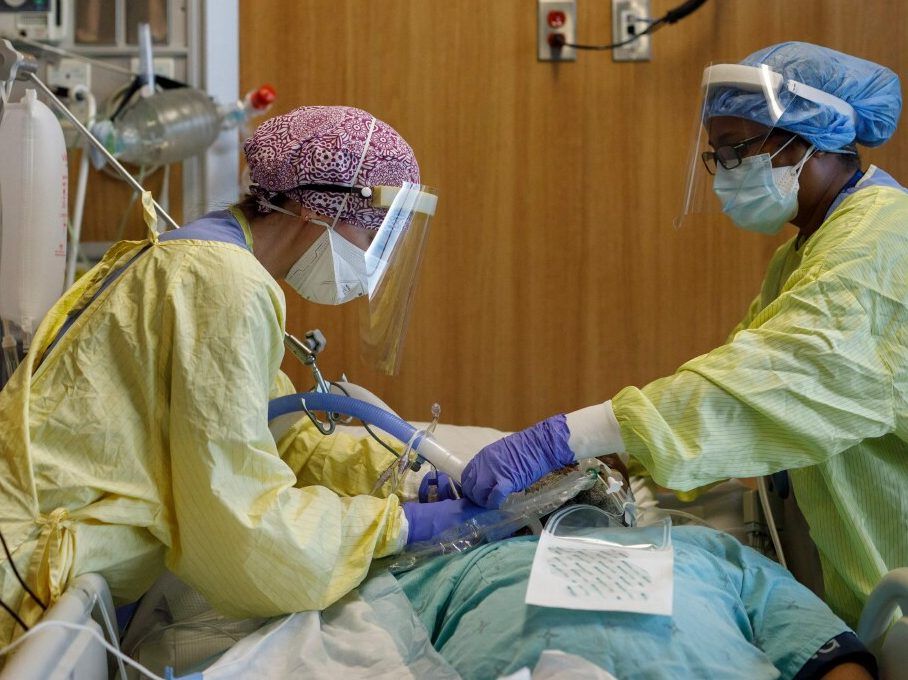
 torontosun.com
torontosun.com
Author of the article:Canadian Press
Canadian Press
Publishing date:Jun 01, 2021 • 1 day ago • 1 minute read • Join the conversation
Redeployed nurses Angela Bedard, left, and Andrea Blake tend to a patient suffering from coronavirus disease (COVID-19) at Humber River Hospital's Intensive Care Unit in Toronto on April 28, 2021.
Redeployed nurses Angela Bedard, left, and Andrea Blake tend to a patient suffering from coronavirus disease (COVID-19) at Humber River Hospital's Intensive Care Unit in Toronto on April 28, 2021. PHOTO BY COLE BURSTON / AFP /Toronto Sun
Article content
MONTREAL — The federal statistics agency says the COVID-19 pandemic led to a drop in Canada’s life expectancy in 2020.
Statistics Canada says it estimates that life expectancy across the country declined by an average of 0.41 years in 2020, adding that the 15,651 deaths caused by COVID-19 contributed to that drop.
It estimates that life expectancy in Quebec — where 8,226 deaths were linked to COVID-19 in 2020 — declined by 0.84 years. In Manitoba, where life expectancy is estimated to have dropped by 0.6 years, is the only other province with a decline above the Canadian average.
Statistics Canada says the average age of people who died from COVID-19 in 2020 was 83.8 years. In 2019, the average age at death was 76.5.
The agency says 2020 is the second year in the past two decades during which life expectancy declined in Canada. In 2017, it declined by 0.07 years, a drop attributed to the opioid epidemic.
Statistics Canada says life expectancy in the country has risen by an average of 0.13 years a year over the past decade.

COVID-19 deaths brought Canadian life expectancy down, Quebec most affected: StatCan
MONTREAL — The federal statistics agency says the COVID-19 pandemic led to a drop in Canada’s life expectancy in 2020.
Anti-vaxxer pastor hospitalized with COVID-19
Author of the article ostmedia News
ostmedia News
Publishing date:Jun 02, 2021 • 6 hours ago • 1 minute read • 38 Comments
Rick Wiles, who runs a conspiracy website called TruNews has spoken out about COVID-19 vaccinations and has said "I am not going to be vaccinated ... I'm going to be one of the survivors. I'm going to survive the genocide," has been hospitalized due to COVID-19.
Rick Wiles, who runs a conspiracy website called TruNews has spoken out about COVID-19 vaccinations and has said "I am not going to be vaccinated ... I'm going to be one of the survivors. I'm going to survive the genocide," has been hospitalized due to COVID-19. PHOTO BY SCREENGRAB /Twitter
Article content
A strong anti-vaccine stance might have fatally impacted a Christian pastor.
Rick Wiles, who runs a website called TruNews and likened the COVID vaccine rollout to “global mass murder,” is now in hospital with COVID-19, according to the New York Daily News.
The pastor at Flowing Streams Church in Florida has proclaimed in one anti-vax message: “You and I are witnessing the first global mass murder, and it’s being led by Satan’s team on the planet.
“You must survive it. Do not be vaccinated.”
A COVID outbreak happened last week, according to the church, and now they say they need prayers for Wiles.
“URGENT REQUEST — please be praying for Rick Wiles right now,” the church posted. “Please repost so that there’s an army of people praying.”
Flowing Streams Vice President Raymond Burkhart sent an email saying Wiles was in hospital.
“Rick is very much in need of your continued prayers. Today, he was taken to the emergency room, and under medical advice, was admitted to the hospital. He is currently on oxygen and is expected to remain there for a number of days,” Burkhart wrote.

 nydailynews.com
nydailynews.com

 torontosun.com
torontosun.com
Author of the article
Publishing date:Jun 02, 2021 • 6 hours ago • 1 minute read • 38 Comments
Rick Wiles, who runs a conspiracy website called TruNews has spoken out about COVID-19 vaccinations and has said "I am not going to be vaccinated ... I'm going to be one of the survivors. I'm going to survive the genocide," has been hospitalized due to COVID-19.
Rick Wiles, who runs a conspiracy website called TruNews has spoken out about COVID-19 vaccinations and has said "I am not going to be vaccinated ... I'm going to be one of the survivors. I'm going to survive the genocide," has been hospitalized due to COVID-19. PHOTO BY SCREENGRAB /Twitter
Article content
A strong anti-vaccine stance might have fatally impacted a Christian pastor.
Rick Wiles, who runs a website called TruNews and likened the COVID vaccine rollout to “global mass murder,” is now in hospital with COVID-19, according to the New York Daily News.
The pastor at Flowing Streams Church in Florida has proclaimed in one anti-vax message: “You and I are witnessing the first global mass murder, and it’s being led by Satan’s team on the planet.
“You must survive it. Do not be vaccinated.”
A COVID outbreak happened last week, according to the church, and now they say they need prayers for Wiles.
“URGENT REQUEST — please be praying for Rick Wiles right now,” the church posted. “Please repost so that there’s an army of people praying.”
Flowing Streams Vice President Raymond Burkhart sent an email saying Wiles was in hospital.
“Rick is very much in need of your continued prayers. Today, he was taken to the emergency room, and under medical advice, was admitted to the hospital. He is currently on oxygen and is expected to remain there for a number of days,” Burkhart wrote.

Anti-vax evangelical pastor Rick Wiles hospitalized with COVID-19, given oxygen
An anti-vaccine evangelical Christian pastor has contracted COVID-19 after describing the available vaccines as “global genocide.” Rick Wiles, who runs a conspiracy website called TruNe…
 nydailynews.com
nydailynews.com

Anti-vaxxer pastor hospitalized with COVID-19
A strong anti-vaccine stance might have fatally impacted a Christian pastor.
In some long COVID cases, air gets trapped in lungs: Study
Author of the article:Reuters
Reuters
Nancy Lapid
Publishing date:Jun 02, 2021 • 5 hours ago • 4 minute read • Join the conversation
A patient suffering from COVID-19 connected to a ventilator tube in the intensive care unit is seen at the King Chulalongkorn Memorial Hospital in Bangkok, Thailand, May 11, 2021.
A patient suffering from COVID-19 connected to a ventilator tube in the intensive care unit is seen at the King Chulalongkorn Memorial Hospital in Bangkok, Thailand, May 11, 2021. PHOTO BY ATHIT PERAWONGMETHA /REUTERS
Reviews and recommendations are unbiased and products are independently selected. Postmedia may earn an affiliate commission from purchases made through links on this page.
Article content
The following is a roundup of some of the latest scientific studies on the novel coronavirus and efforts to find treatments and vaccines for COVID-19, the illness caused by the virus.
In some long COVID cases, air gets trapped in lungs
Mexico accuses three fashion brands of cultural appropriation
Trackerdslogo
Some COVID-19 survivors with persistent breathing symptoms have a condition called “air trapping,” in which inhaled air gets stuck in the small airways of the lung and cannot be exhaled. Researchers studied 100 COVID-19 survivors who were still having respiratory problems, like coughs and shortness of breath, an average of more than two months after their diagnosis. Overall, 33 had been hospitalized, including 16 who had needed intensive care. The amount of lung area showing so-called ground-glass opacities on imaging studies – a typical sign of lung damage from COVID-19 – was higher in the hospitalized group than in those with milder disease, and it was even higher in patients who had required intensive care. COVID-19 severity made little difference in the average percentage of lung affected by air trapping, however. It was 25.4% in patients not hospitalized, 34.5% in those who were hospitalized without intensive care, and 27.2% in patients who had been critically ill. By comparison, that proportion was 7.3% in a group of healthy volunteers. The air trapping was largely confined to patients’ narrowest airway passages, according to a report posted on Saturday on medRxiv ahead of peer review. “The long-term consequences” of these patients’ small airways disease “are not known,” the authors said.
Advertisement
STORY CONTINUES BELOW
Article content
High vitamin D levels do not protect against COVID-19
Low levels of vitamin D have been tied to higher risks for COVID-19 and more severe illness, although no studies have proved that vitamin D deficiency is actually to blame. A study published on Tuesday in PLoS Medicine suggests that boosting vitamin D levels with supplements would not help. Researchers studied more than 1.2 million people of European ancestry from 11 countries, some of whom had genetic variants that result in naturally higher levels of vitamin D. People with these variants did not have a lower risk for coronavirus infection, hospitalization, or severe COVID-19, the researchers reported. Their results suggest that boosting vitamin D levels in deficient people probably would not help combat the coronavirus, and they do not believe randomized trials testing vitamin D supplementation would be worthwhile. Other experts, however, would still like to see such trials, especially in people of African and other non-European ancestries.
Advertisement
STORY CONTINUES BELOW
Article content
Immune system workaround helps blood cancer patients with COVID-19
In blood cancer patients who lack antibody-producing cells, other immune cells can compensate to help fight the coronavirus, new research shows. People with blood cancers – such as leukemia, lymphoma, and myeloma – often lack antibody-making immune cells called B cells, particularly after treatment with certain medications. Without enough B cells and antibodies, they are at risk for severe COVID-19. But other immune cells, called T cells, learn to recognize and attack the virus, according to a report published in Nature Medicine. Blood cancer patients in the study were more likely to die from COVID-19 than patients with solid tumors or without cancer. But among the blood cancer patients, those with higher levels of CD8 T cells were more than three times more likely to survive than those with lower levels of CD8 T cells. The authors speculate that CD8 T cell responses to COVID-19 vaccines might protect blood cancer patients even if they do not have typical antibody responses. “This work can help us advise patients while we wait for more vaccine specific studies,” said co-author Dr. Erin Bange of the University of Pennsylvania in a statement. While patients’ vaccine response “likely will not be as robust as their friends/family who don’t have blood cancers, it is still … potentially lifesaving,” Bange added.
Advertisement
STORY CONTINUES BELOW
Article content
Coronavirus does not threaten U.S. blood supply
Current guidelines for screening U.S. blood donors for symptoms of COVID-19 and for a history of recent infections are effectively protecting the blood supply from contamination with the new coronavirus, researchers say. In a study conducted for the National Institutes of Health, researchers tested nearly 18,000 “minipools” of blood samples – that is, blood samples pooled from total of roughly 258,000 donors from across the country. Only three minipools contained genetic material from the virus, according to a report published in the journal Transfusion. In all three, the viral levels were low. In the one minipool that could be tested for infectivity, the virus material was noninfectious, the researchers said. “Other studies have shown that in rare cases where a blood sample tested positive, transmission by blood transfusion has not occurred,” coauthor Sonia Bakkour of the University of California, San Francisco, said in a statement. “Therefore, it appears safe to receive blood as a transfusion recipient and to keep donating blood, without fear of transmitting COVID-19 as long as current screenings are used.”
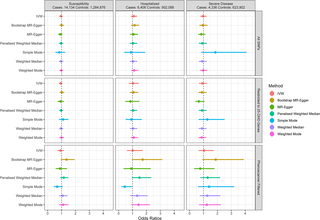
 journals.plos.org
journals.plos.org

 medrxiv.org
medrxiv.org
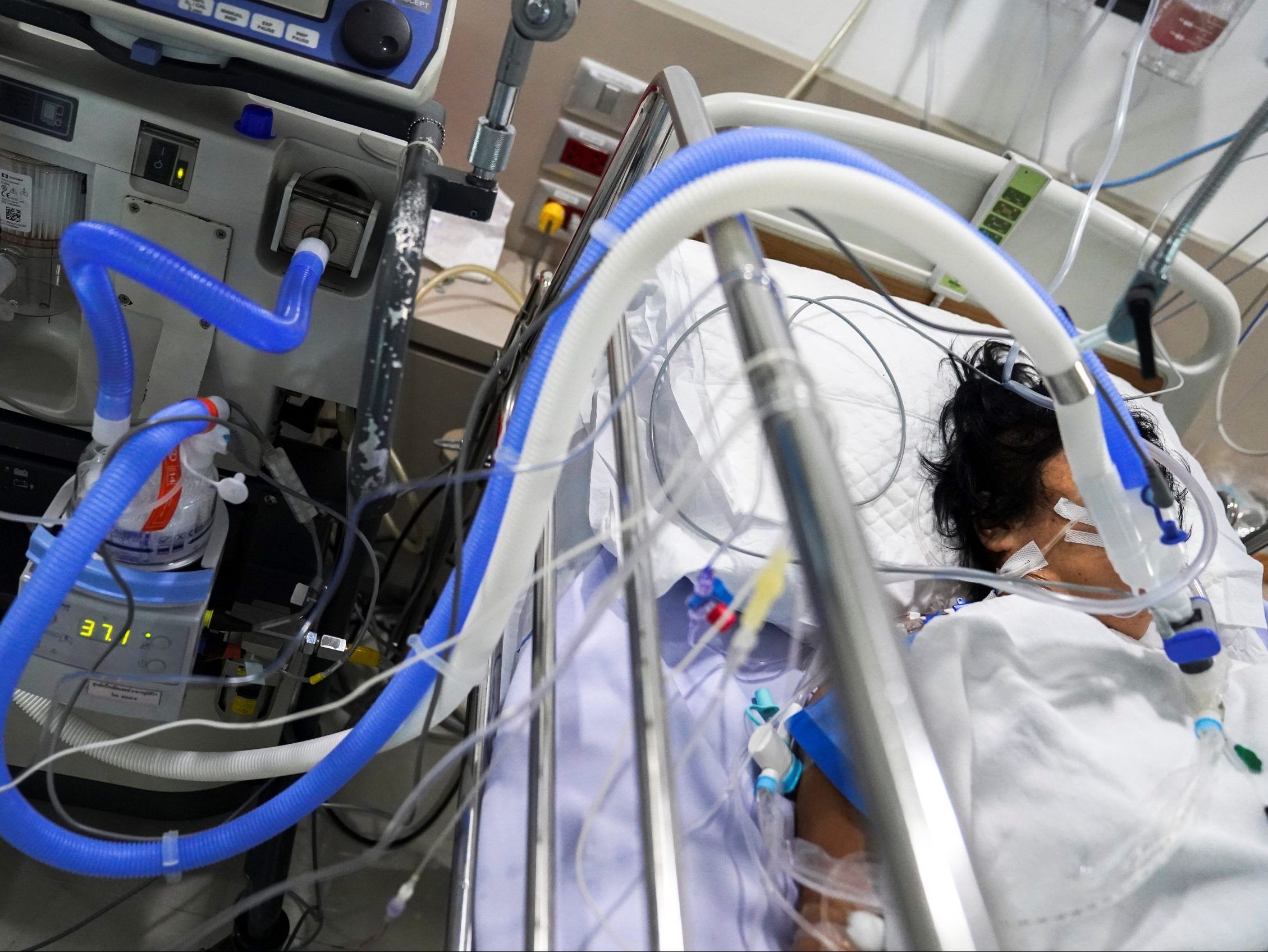
 torontosun.com
torontosun.com
Author of the article:Reuters
Reuters
Nancy Lapid
Publishing date:Jun 02, 2021 • 5 hours ago • 4 minute read • Join the conversation
A patient suffering from COVID-19 connected to a ventilator tube in the intensive care unit is seen at the King Chulalongkorn Memorial Hospital in Bangkok, Thailand, May 11, 2021.
A patient suffering from COVID-19 connected to a ventilator tube in the intensive care unit is seen at the King Chulalongkorn Memorial Hospital in Bangkok, Thailand, May 11, 2021. PHOTO BY ATHIT PERAWONGMETHA /REUTERS
Reviews and recommendations are unbiased and products are independently selected. Postmedia may earn an affiliate commission from purchases made through links on this page.
Article content
The following is a roundup of some of the latest scientific studies on the novel coronavirus and efforts to find treatments and vaccines for COVID-19, the illness caused by the virus.
In some long COVID cases, air gets trapped in lungs
Mexico accuses three fashion brands of cultural appropriation
Trackerdslogo
Some COVID-19 survivors with persistent breathing symptoms have a condition called “air trapping,” in which inhaled air gets stuck in the small airways of the lung and cannot be exhaled. Researchers studied 100 COVID-19 survivors who were still having respiratory problems, like coughs and shortness of breath, an average of more than two months after their diagnosis. Overall, 33 had been hospitalized, including 16 who had needed intensive care. The amount of lung area showing so-called ground-glass opacities on imaging studies – a typical sign of lung damage from COVID-19 – was higher in the hospitalized group than in those with milder disease, and it was even higher in patients who had required intensive care. COVID-19 severity made little difference in the average percentage of lung affected by air trapping, however. It was 25.4% in patients not hospitalized, 34.5% in those who were hospitalized without intensive care, and 27.2% in patients who had been critically ill. By comparison, that proportion was 7.3% in a group of healthy volunteers. The air trapping was largely confined to patients’ narrowest airway passages, according to a report posted on Saturday on medRxiv ahead of peer review. “The long-term consequences” of these patients’ small airways disease “are not known,” the authors said.
Advertisement
STORY CONTINUES BELOW
Article content
High vitamin D levels do not protect against COVID-19
Low levels of vitamin D have been tied to higher risks for COVID-19 and more severe illness, although no studies have proved that vitamin D deficiency is actually to blame. A study published on Tuesday in PLoS Medicine suggests that boosting vitamin D levels with supplements would not help. Researchers studied more than 1.2 million people of European ancestry from 11 countries, some of whom had genetic variants that result in naturally higher levels of vitamin D. People with these variants did not have a lower risk for coronavirus infection, hospitalization, or severe COVID-19, the researchers reported. Their results suggest that boosting vitamin D levels in deficient people probably would not help combat the coronavirus, and they do not believe randomized trials testing vitamin D supplementation would be worthwhile. Other experts, however, would still like to see such trials, especially in people of African and other non-European ancestries.
Advertisement
STORY CONTINUES BELOW
Article content
Immune system workaround helps blood cancer patients with COVID-19
In blood cancer patients who lack antibody-producing cells, other immune cells can compensate to help fight the coronavirus, new research shows. People with blood cancers – such as leukemia, lymphoma, and myeloma – often lack antibody-making immune cells called B cells, particularly after treatment with certain medications. Without enough B cells and antibodies, they are at risk for severe COVID-19. But other immune cells, called T cells, learn to recognize and attack the virus, according to a report published in Nature Medicine. Blood cancer patients in the study were more likely to die from COVID-19 than patients with solid tumors or without cancer. But among the blood cancer patients, those with higher levels of CD8 T cells were more than three times more likely to survive than those with lower levels of CD8 T cells. The authors speculate that CD8 T cell responses to COVID-19 vaccines might protect blood cancer patients even if they do not have typical antibody responses. “This work can help us advise patients while we wait for more vaccine specific studies,” said co-author Dr. Erin Bange of the University of Pennsylvania in a statement. While patients’ vaccine response “likely will not be as robust as their friends/family who don’t have blood cancers, it is still … potentially lifesaving,” Bange added.
Advertisement
STORY CONTINUES BELOW
Article content
Coronavirus does not threaten U.S. blood supply
Current guidelines for screening U.S. blood donors for symptoms of COVID-19 and for a history of recent infections are effectively protecting the blood supply from contamination with the new coronavirus, researchers say. In a study conducted for the National Institutes of Health, researchers tested nearly 18,000 “minipools” of blood samples – that is, blood samples pooled from total of roughly 258,000 donors from across the country. Only three minipools contained genetic material from the virus, according to a report published in the journal Transfusion. In all three, the viral levels were low. In the one minipool that could be tested for infectivity, the virus material was noninfectious, the researchers said. “Other studies have shown that in rare cases where a blood sample tested positive, transmission by blood transfusion has not occurred,” coauthor Sonia Bakkour of the University of California, San Francisco, said in a statement. “Therefore, it appears safe to receive blood as a transfusion recipient and to keep donating blood, without fear of transmitting COVID-19 as long as current screenings are used.”
Vitamin D and COVID-19 susceptibility and severity in the COVID-19 Host Genetics Initiative: A Mendelian randomization study
In a Mendelian randomization analysis, Guillaume Butler-Laporte, Tomoki Nakanishi, and colleages study genetic evidence for a relationship between vitamin D and COVID-19 outcomes.

Small Airways Disease is a Post-Acute Sequelae of SARS-CoV-2 Infection
medRxiv - The Preprint Server for Health Sciences

In some long COVID cases, air gets trapped in lungs: Study
The following is a roundup of some of the latest scientific studies on the novel coronavirus and efforts to find treatments and vaccines for COVID-19, the illness c…
HUGE: Fauci Busted In His Own Emails…Truth Is Out!
IF YOU LOVE NEWS, YOU'LL LOVE OUR HOMEPAGE!June 2, 2021
CLICK HERE TO READ THE FULL ARTICLE
As early as 2018 US State Department officials warned about safety risks at the Wuhan Institute of Virology lab on scientists conducting risky tests with the bat coronavirus.
US officials made several trips to the Wuhan laboratory.
Despite the warnings, the US National Institute of Health (NIH) under Dr. Anthony Fauci awarded a $3.7 million grant to the Wuhan lab studying the bat virus. This was after State Department warned about the risky tests going on in the lab.
The deadly China coronavirus that started in China sometime in late 2019 has now circled the globe. Evidence suggests that the coronavirus didn’t come naturally. We still don’t know whether the deadly virus was leaked intentionally or if it was an accident.
** And yet as recently as February 9, 2021, the World Health Organization (WHO) has denied the coronavirus leaked from a lab in Wuhan!
But a video has surfaced from December 2019 of WHO official Peter Daszak admitting to coronavirus manipulation at the Wuhan Lab before the pandemic was announced.
The video interview was originally filmed on December 9, 2019. A copy was posted in May 2020.
As Dr. Lawrence Sellin reported at The Gateway Pundit back in July 2020 — Dr. Peter Daszak, President of the EcoHealth Alliance and a long-time collaborator with the Wuhan Institute of Virology, presumably was referring to the Ralph Baric- Zheng-Li Shi experiments, stated “you can manipulate them in the lab pretty easily” inserting a spike protein “into a backbone of another virus.”
And yet for over a year Dr. Anthony Fauci has vehemently denied the Wuhan coronavirus was man-made until last month when Dr. Fauci admitted it may have possibly been naturally occurring.
On Tuesday emails from April 2020 were released via FOIA.
In one email from April 18, 2020, Dr. Peter Daszak thanked Dr. Fauci for insisting the COVID-19 virus was naturally occurring — when both men knew this was a lie.
And now a second email surfaced from the Fauci email dump that shows Dr. Fauci was told inlate January 2020 that some of the features of the coronavirus “look engineered.”
Dr. Fauci knew the truth.
And he lied about it for over year — maybe because he was funding the projects — something else he lied about.

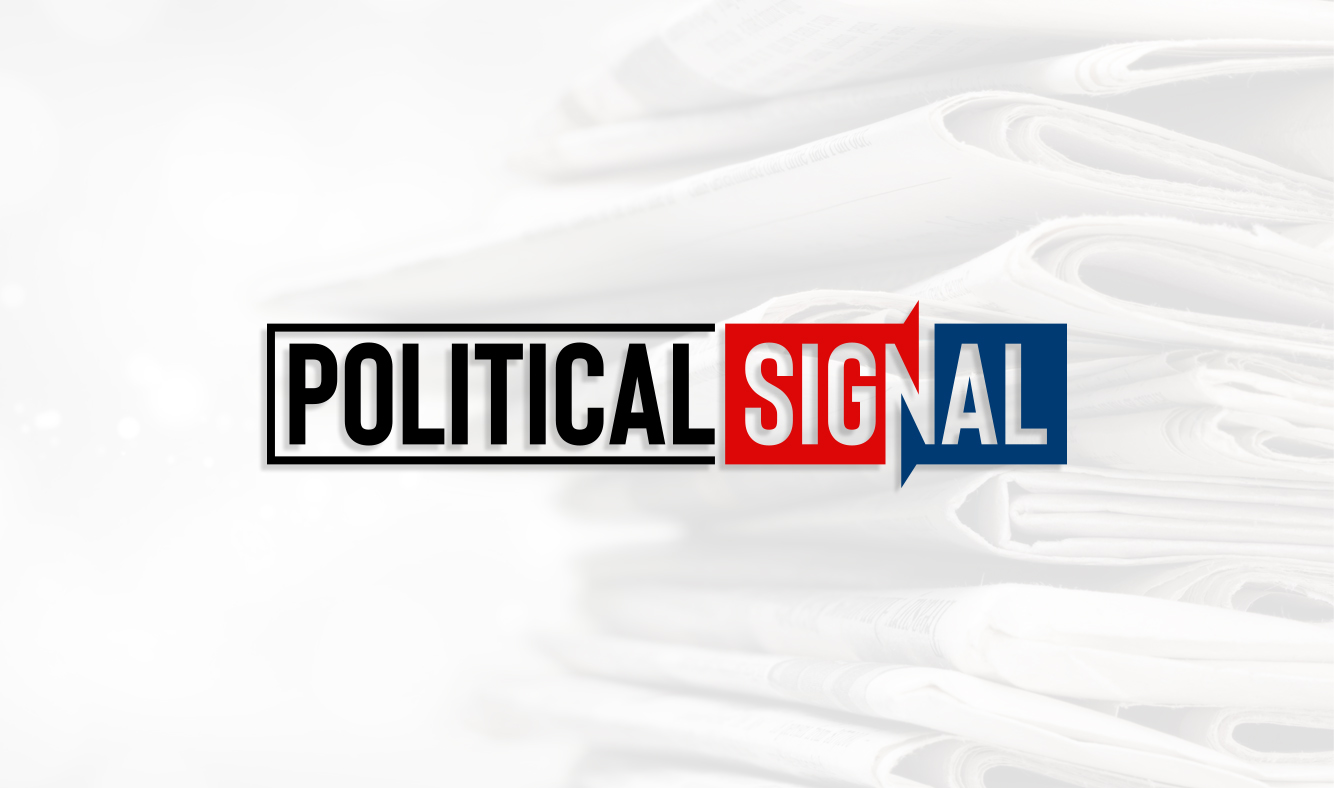
'Belgian Rambo' feared to be on the loose with hit list
Author of the article ostmedia News
ostmedia News
Publishing date:Jun 02, 2021 • 4 hours ago • 1 minute read • Join the conversation
The original Rambo.
The original Rambo. PHOTO BY FILES /Files
Article content
There are fears in Belgium that an armed anti-lockdown extremist wants to kill 10 people on a hit list.
Far-right terrorist Cpl. Jurgen Conings, who has been dubbed the “Belgian Rambo,” has evaded capture during a nationwide manhunt for the last two weeks, according to the Daily Star.
Belgian police have reportedly beefed up security for those on Conings’s list, which includes his ex-wife, her lawyer, Belgian Defence Minister Ludivine Dedonder, and a top COVID-19 expert.
Conings reportedly wrote the list and then emptied his bank account and disappeared.
Jurgen Conings. Unknown photo source.
Jurgen Conings. Unknown photo source. PHOTO BY UNKNOWN /Unknown
Reports say Conings was armed with heavy weapons, including four anti-tank rocket launchers from a barracks when he went missing.
In letters, he said he no longer wanted to live in a society ruled by “politicians and virologists” and wanted to join the “resistance.”
Conings, 46, abandoned his car on May 18 near a national park in Limburg. The rocket launchers were reportedly found in the car.
Conings is a former sniper who served in Iraq and Afghanistan.
The report said the rest of the people who have been given extra security include senior figures in the Belgian military, which disciplined him for his political views last year.
Investigators have said it is possible that Conings has killed himself, but that they assume he is still alive.

 dailystar.co.uk
dailystar.co.uk

 torontosun.com
torontosun.com
Author of the article
Publishing date:Jun 02, 2021 • 4 hours ago • 1 minute read • Join the conversation
The original Rambo.
The original Rambo. PHOTO BY FILES /Files
Article content
There are fears in Belgium that an armed anti-lockdown extremist wants to kill 10 people on a hit list.
Far-right terrorist Cpl. Jurgen Conings, who has been dubbed the “Belgian Rambo,” has evaded capture during a nationwide manhunt for the last two weeks, according to the Daily Star.
Belgian police have reportedly beefed up security for those on Conings’s list, which includes his ex-wife, her lawyer, Belgian Defence Minister Ludivine Dedonder, and a top COVID-19 expert.
Conings reportedly wrote the list and then emptied his bank account and disappeared.
Jurgen Conings. Unknown photo source.
Jurgen Conings. Unknown photo source. PHOTO BY UNKNOWN /Unknown
Reports say Conings was armed with heavy weapons, including four anti-tank rocket launchers from a barracks when he went missing.
In letters, he said he no longer wanted to live in a society ruled by “politicians and virologists” and wanted to join the “resistance.”
Conings, 46, abandoned his car on May 18 near a national park in Limburg. The rocket launchers were reportedly found in the car.
Conings is a former sniper who served in Iraq and Afghanistan.
The report said the rest of the people who have been given extra security include senior figures in the Belgian military, which disciplined him for his political views last year.
Investigators have said it is possible that Conings has killed himself, but that they assume he is still alive.

Fears Belgian Rambo 'has 10-man hit list' including ex-wife and her lawyer
Far-right terrorist Corporal Jurgen Conings remains on the run two weeks after disappearing with rocket launchers in Belgium as investigators increase security for ten people

'Belgian Rambo' feared to be on the loose with hit list
There are fears in Belgium that an armed anti-lockdown extremist wants to kill 10 people on a hit list.
